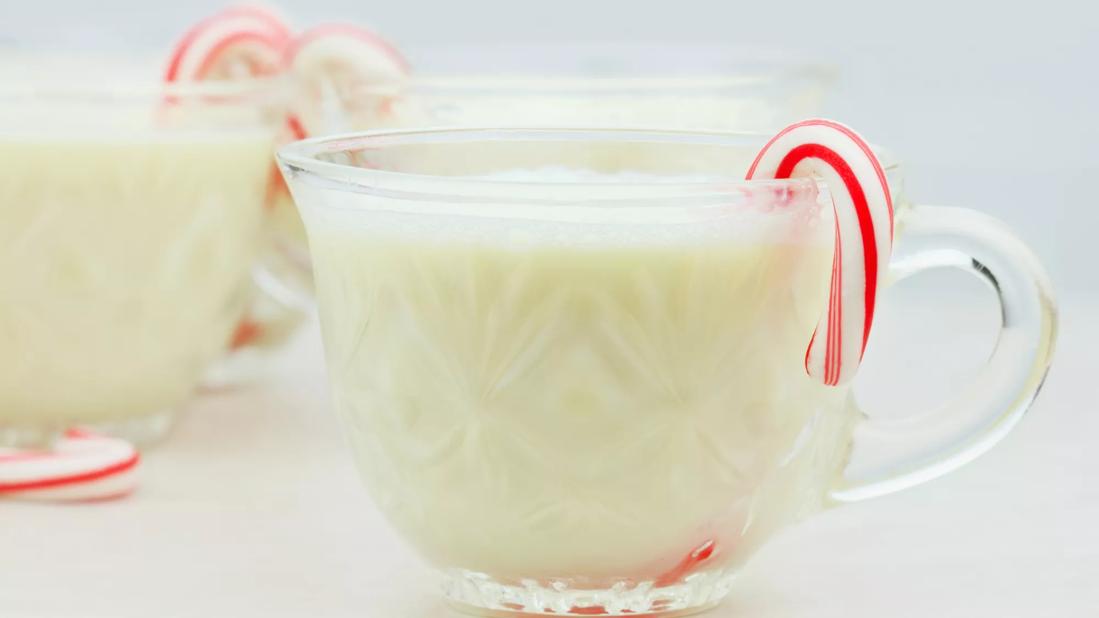Tips for safely consuming this holiday beverage

Image content: This image is available to view online.
View image online (https://assets.clevelandclinic.org/transform/d66cc2b6-e748-4b99-ab04-f723341c950f/GettyImages-133598190_jpg)
Delicious eggnog with mini candy canes
Drinking raw eggs might not appeal to everyone’s holiday tradition, but eggnog continues to hold its ground despite the skepticism.
Advertisement
Cleveland Clinic is a non-profit academic medical center. Advertising on our site helps support our mission. We do not endorse non-Cleveland Clinic products or services. Policy
And what exactly is in this festive drink?
Well for starters it contains – you guessed it – eggs. Most classic recipes call for raw eggs, sugar, milk, heavy cream, alcohol and spices like nutmeg, cloves or cinnamon.
But we can’t help but think of the universal warning of moms everywhere to not eat raw cookie dough. So how is consuming eggnog any different?
Dietitian Maxine Smith, RD, LD, gives us the low down on this classic holiday beverage.
According to the FDA, to reduce your risk of contracting a food-borne illness from consuming raw eggs – you should use pasteurized eggs in the shell.
“The primary concern with consuming raw eggs is salmonella, but the risk of actually contracting it is pretty small,” explains Smith. “Still, buying and using pasteurized eggs is your safest and easiest bet.”
Eggs that have already been pasteurized have gone through a heating process to kill the bacteria that cause salmonella. You can pasteurize your own eggs at home, but it can be a little tricky.
If you overcook the eggs you could end up hard boiling them. And if you undercook the eggs, you risk not killing all the bacteria. The FDA says that pasteurized eggs need to reach 160 degrees Fahrenheit or hotter to be considered safe.
Advertisement
Most egg products like liquid egg whites and commercial eggnogs are already pasteurized, so no need to worry there.
“The more handling that is involved in a product the more prone it is to exposure and contamination,” says Smith. “That’s why it’s recommended to use pasteurized eggs in the shell instead of a pasteurized egg product when a recipe calls for raw eggs.”
There are also recipes that instruct you to heat up the eggnog after all of the ingredients are combined. So cooking it at the end would kill the bacteria and risk.
How far in advance can you make eggnog?
Homemade, chilled eggnog can last two to four days in the fridge. So toss it after the fourth day. Also don’t let it sit out for longer than two hours.
Will the alcohol in eggnog kill the bacteria if you don’t use pasteurized eggs?
Nope. Smith says that there have been small studies that show alcohol might kill some of the bacteria, but don’t count on the alcohol to provide a safe product.
Is there a way to enjoy eggnog without sacrificing your diet?
Eggnog is loaded with saturated fat and sugar. It also has a significant amount of cholesterol, which you really can’t do anything about since it’s from the eggs. (And without the eggs in eggnog it would just be, well, nog.)
Try substituting heavy cream and full fat dairy products with low fat dairy products or a milk alternative like almond or oat milk.
If you want to cut back on the sugar, substitute or replace part of the sugar that is called for with honey (although still a form of sugar, it can provide good flavor from a smaller amount), stevia or monk fruit.
And you can always skip on the alcohol or limit yourself to one small glass.
Advertisement

Sign up for our Health Essentials emails for expert guidance on nutrition, fitness, sleep, skin care and more.
Learn more about our editorial process.
Advertisement
Be mindful of how many eggs you’re eating, how you prepare them and the other sources of saturated fat in your diet
You can use applesauce, tofu, chia seeds and more in place of eggs
Pasture-raised and organic eggs have additional nutritional benefits
If you’re eating more than one egg per day, you might want to cut back
The scoop on whether it’s safe to eat raw eggs
Egg labels aren't all they're cracked up to be
Health officials say that consuming unpasteurized milk increases potential exposure to harmful bacteria
Salmonella is a common bacterium that can contaminate raw meat, eggs, seafood and more
Prioritize your health by managing stress, strengthening your social connections and getting quality sleep
Bolsters, blankets, pillows and blocks can offer extra support, stability and comfort
Allergies, postnasal drip, asthma or reflux could be to blame for a cough that won’t quit